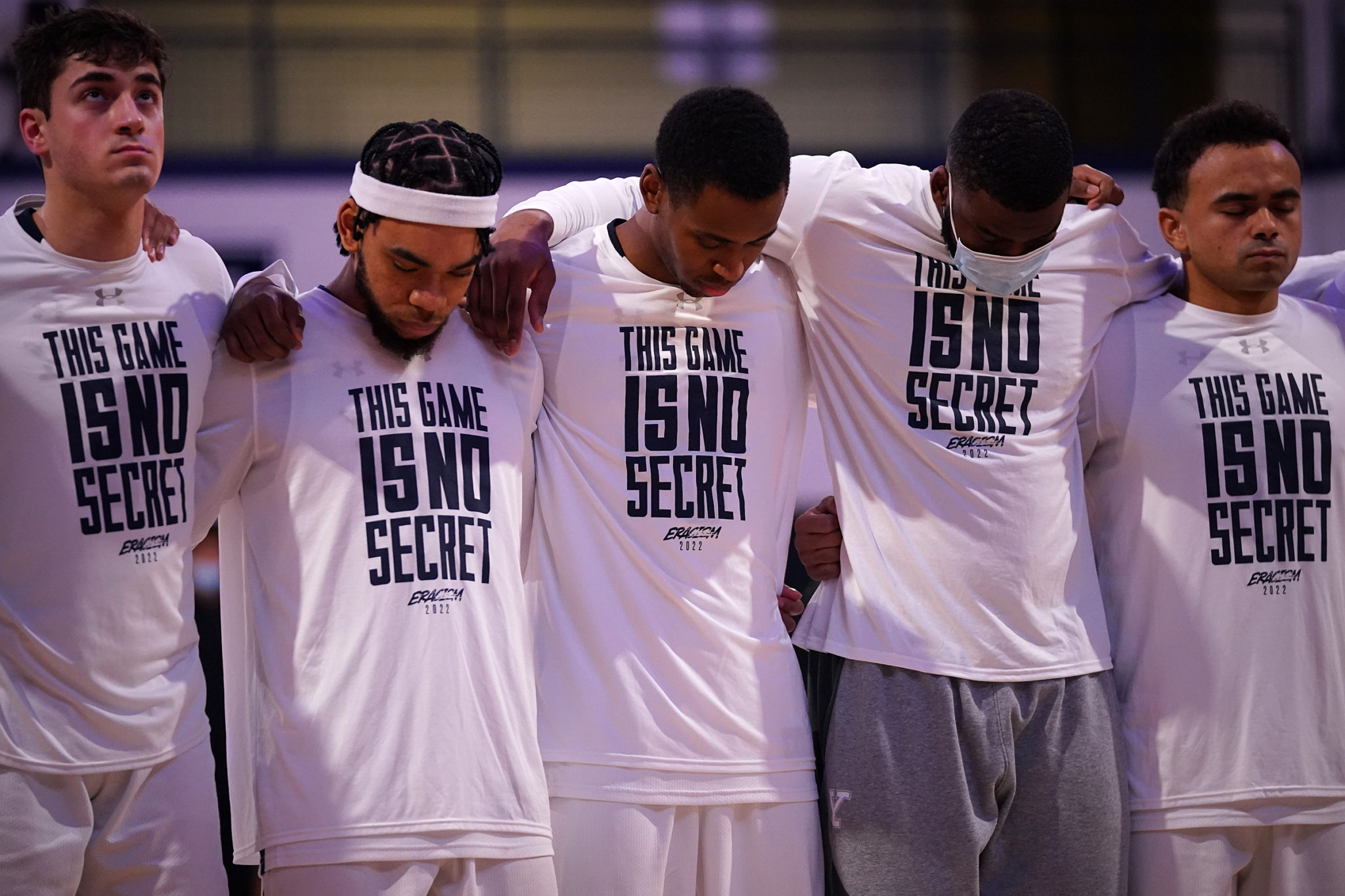MEN’S BASKETBALL: “This Game is No Secret:” The story behind Yale’s warmup shirts last Friday
Yale participated in an initiative organized by College Insider’s Eracism committee to honor John McLendon and recognize one of the first integrated games of basketball in the Jim Crow South.

Tim Tai, Staff Photographer
Before practice one day last week, Yale men’s basketball head coach James Jones gathered his squad for a team meeting and a history lesson.
Yale was preparing for its first Ivy League back-to-back of the season, consecutive games against Dartmouth and Harvard that the Bulldogs ended up sweeping. But the team thought back to 1944 that afternoon, a decade before the U.S. Supreme Court’s Brown v. Board of Education decision and a time when basketball teams from Black colleges were still not allowed to participate in the NCAA Tournament and the National Invitational Tournament. That year in Durham, North Carolina, Jones told his players, Hall of Fame coach John McLendon led what is now North Carolina Central against an all-white team from Duke in a scrimmage known as the “secret game.” Taking place behind bolted gym doors on a Sunday morning, the game, which occurred when Jim Crow laws still criminalized interracial interaction, was one of the first integrated games of college basketball in the South.
That discussion set the stage for Friday night, when players donned pregame warmup shirts that read, “This Game is No Secret.” The shirts were the centerpiece of an initiative organized by Eracism, a social-change committee formed in December 2020 by the basketball website and tournament sponsor College Insider.
“It’s funny because coach Jones told us the story and explained where Eracism came from, but finished the story without even telling us who won between Duke and NC Central,” Yale captain and guard Jalen Gabbidon ’22 said. “So you know that was the first question anyone asked after he was done.”
No official scorecard exists, but the final has been widely reported. NC Central beat Duke, 88–44, playing an up-tempo style of offense that McLendon trademarked. According to Scott Ellsworth’s history of the game, a writer from The Carolina Times, a Black weekly, agreed not to publish anything when he learned of the contest. McLendon also did not tell his school’s administration about the game.
“I had never played basketball against a white person before, and I was a little shaky,” Aubrey Stanley, who played in the game under McLendon, said in a 1996 New York Times Magazine story. But by the second half, McLendon’s Eagles were scoring almost every trip up the floor. After the first game, the two teams mixed their rosters and played again with new teammates.
Jones called McLendon “the father of the fast break” when relating the tale and reflecting on its significance after Yale’s 72–69 win over Dartmouth Friday night.
“The guys from Duke had to take these cars over, and they took a back route. They had the game on a Sunday because the police were in church,” Jones said. “They did all these things just to be able to have this game. If you think about it today, it’s kind of ridiculous that this is what had to happen in this country.”
Jones said the purpose of the initiative, which occurred toward the beginning of Black History Month, was to honor the memory of McLendon and his often overlooked contributions to the sport. In addition to the fast break, they included the full-court press and four corners offense later used by North Carolina coach Dean Smith. According to his obituary, McLendon, who died in 1999, had his players run three miles every day before the season when he coached at Tennessee State, conditioning that enabled his teams’ fast pace of play. When Cleveland State hired him in 1966, he became the first Black coach at a predominantly white institution.
Last winter marked the debut of the “This Game is No Secret” initiative, but Yale and other Ivy League teams had their first opportunity to participate last weekend because of last year’s COVID-19 cancellation of Ancient Eight athletic competition. Dartmouth and Harvard also wore the shirts before their games in New Haven last weekend, and Brown, Cornell and Columbia did before their games too. Division I programs across the nation — Miami, Cincinnati, Howard, Houston, Iowa and New Mexico State, among others — also participated.
Gabbidon said he hoped fans who saw the shirts — either on ESPNU, where the Yale-Dartmouth game was nationally televised, or within the John J. Lee Amphitheater, where attendance was still limited to faculty, staff and graduate and professional students on Friday night — took the time to read about McLendon and learn a new piece of Black history in America.
Today, Jones is one of two Black head coaches of 16 Ivy League men’s and women’s basketball programs, along with Harvard men’s basketball head coach Tommy Amaker. Jones sits on the College Insider Eracism committee with a multiracial group of other Division I men’s basketball head coaches, including Houston’s Kevin Sampson, Texas’s Chris Beard, Oklahoma State’s Mike Boynton and Columbia’s Jim Engles.
One of the group’s main initiatives involves advocating for minority coaches in the sport. According to Eracism, just 11 of 65 head coaches at Power 5 schools — in the ACC, Big Ten, Big 12, Pac-12 and SEC — are Black, a figure disproportionate to the percentage of Black men’s basketball players at many of those schools. 53.2 percent of all DI men’s basketball players are Black, according to the Institute for Diversity and Ethics in Sport’s 2020 Racial and Gender Report Card.
“We’ve tried to help minority coaches get jobs, and put the word out there, understanding that we all have to live together, and it’s better when we can coexist in a positive way,” Jones said.
Before Eracism was established in December 2020, Jones joined the Board of Directors for the Advancement of Blacks in Sports in September 2020.







